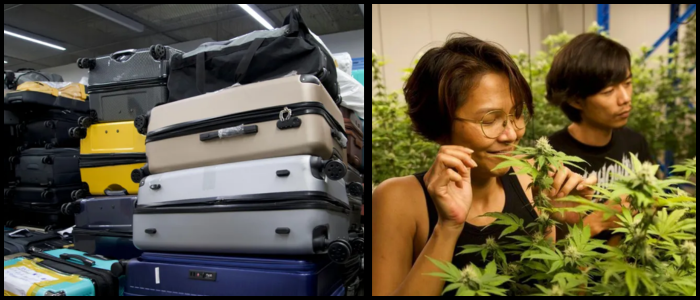Investment in the cannabis industry has boomed since decriminalisation. And now, there are more than 11,000 dispensaries across the country, and marijuana products including edibles are readily available online, even if some products are technically illegal. Even a tourist hotspot like Bangkok's Khao San Road is home to an entire shopping mall exclusively for cannabis. Political opposition from pro-cannabis legalisation parties had blocked previous government moves to reign in the industry.
UK Pressure Mounts On Surge in Smuggling Cases
International concern grew when the British reported the largest amount of Thai weed smuggled into their country. Some 800 couriers transported 26 tonnes of cannabis from Thailand to Britain in 2024, up from 142 couriers and five tonnes in 2023, according to the UK's National Crime Agency (NCA). The majority of traffickers are young travellers who allow themselves to be recruited by drug syndicates that promise them fast money.
The recent arrests of two British women with significant quantities of Thai marijuana point to the problem's escalation. In Britain, 173 people — mainly low-level smugglers from Thailand — have been sentenced to 230 years in prison so far this year. NCA spokeswoman Beki Wright said: "Thousands of people think there is little risk in sexually exploiting children because they do not know the potentially devastating consequences of being caught.
Thai officials have been ordered to clamp down on trafficking, under pressure from the UK. "There's no loser," he said, though he admitted current penalties are light for both sides. Smugglers typically dump their luggage at airports to avoid arrest and fines remain the punishment of choice. Customs officers are increasingly using licensing laws to clamp down.
Will Industry Rebel at New Restrictions?
Amid the chaos, efforts to regulate the cannabis trade ground to a halt after a regulatory framework was rejected in parliament. Some lawmakers blamed interference by special interests in the business of the marijuana industry. Meanwhile, the absence of control has allowed foreign organized crime gangs to establish extensive growth operations under Thai names.
Even as more and more cannabis has flooded the market and prices have plummeted, smugglers have continued to capitalize on the disparity in prices and profit margins abroad. Tom Kruesopon, a businessman who used to campaign for the legalisation of cannabis, now supports the new restrictions, claiming the current scenario is completely out of hand. "When you have weed shop on every corner and tourists smoking out on the beach, we have to regulate this," he said.
Smaller cannabis businesses say the new measures penalize the legal growers and sellers while having little impact on black-market activity. Kitty Chopaka, a well-known cannabis advocate, shut down her dispensary because of market saturation and believes the current regulations should be enforced rather than new ones added. Legal farm manager Parinya Sangprasert said it obeyed licensing rules and kept a record of every sale, something that could not be said about illicit operations.
Thailand's customs officials have increased intelligence gathering on smuggling and have intensified checks. But enforcement hurdles persist, with fines serving as the most frequent punishment. In a matter of weeks, three tonnes of cannabis have been seized at airports, stowed in rooms holding hundreds of suitcases with names of cannabis strains on them, such as "Zkittlez" and "Runtz".
World

Thailand Cracks Down on Marijuana Amid Smuggling Surge

Thailand has adopted new regulations that have put its marijuana industry under lockdown, with locals now forced to get doctors' prescriptions to buy weed. The development has followed growing concerns that relaxed cannabis laws in the country since 2022 have led to an unregulated market that is now driving international smuggling, especially to the UK. Public health authorities have also suggested that full criminalisation of cannabis use could be rolled back, though no date has been given.















